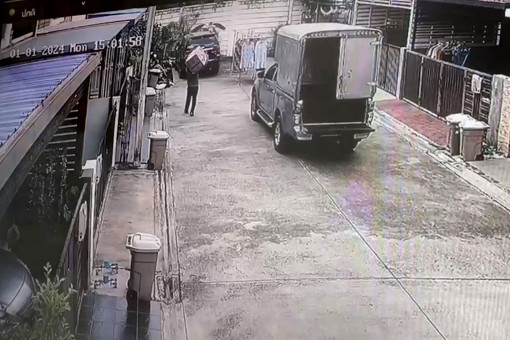
On Jan 2, police in Nonthaburi seized 7.5 kilogrammes of cocaine following a complaint by a homeowner in Muang district about a suspicious package sent to his house.
Inside a cardboard box, on which his daughter’s name was written as the recipient, police found 15 seat cushions; each one hid a 500g packet of cocaine.
According to the homeowner, his daughter, a student in Australia, had posted an online message offering transnational courier help.
Such help, commonly called rub hew, or “to help carry” in Thai, is popular among youngsters studying abroad who want to earn extra money as they travel.
The rub hew service can be found on social media pages used by overseas student groups or frequent travellers. The fees range from a couple of hundred baht to several thousand per trip, depending on the weight. Thus, the service is sometimes referred to as khai nam nak or “weight for sale”.
Offering and seeking transnational courier help is common among Thais. Many do it without asking to be paid. One reason is Thais tend to regard people as friends and family.
Of course, it is unsafe to carry items across borders for other people, according to authorities.
“The rub hew work has been around for a long time, and many couriers end up victims of drug trafficking networks, as they don’t know the package contains drugs,” said Piyasiri Wattanavarangkul, deputy secretary-general of the Office of the Narcotics Control Board (ONCB).
He said traffickers would conceal the drugs in a package and give it to an unsuspecting courier. Yet this doesn’t excuse couriers from being prosecuted if they are found with an illegal substance.
According to the Narcotics Suppression Bureau (NSB), 16 Thais were arrested at Suvarnabhumi, Don Mueang and Phuket airports in 2023 while trying to smuggle drugs out of the country.
NSB commissioner, Pol Lt Gen Khirisak Tantinvachai, said most of the offenders knew they were carrying drugs, which were mostly heroin and methamphetamines.

Most ‘narcotraffic’ takes place via postal parcel services to avoid searches at the airport or other border crossings, says Narcotics Suppression Bureau commissioner Pol Lt Gen Khirisak Tantinvachai.
Pol Lt Gen Khirisak said the Jan 2 case was a wake-up call that such a practice entails risks.
“There are several online channels where people advertise for courier travellers. It’s a harmless act but may allow perpetrators to exploit innocent people in committing a serious crime.”
The NSB has a technology team to monitor the online activities of drug smuggling networks and prevent the public from falling victim to them.
“To block and suppress the trafficking of drugs, the NSB also works with Thai Customs, the ONCB and airport authorities, as well as our counterparts in other countries.
“However, we are not able to search every single piece of luggage that departs or arrives in the country. Our work is rather based on cooperative analysis and investigations. So, we may focus on some types of travellers or passengers from specific countries much more than others.”
Most ‘narcotraffic’ takes place via postal parcel services to avoid searches at the airport or other border crossings, according to Pol Lt Gen Khirisak.
“Last year, the NSB intercepted over 70 parcels and shipments almost every week. The destinations were Australia, Hong Kong, Taiwan, Israel, New Zealand and 14 countries in Europe,” he said, adding that large quantities of drugs were usually seized.
Pol Lt Gen Khirisak said smugglers usually hire people to do the transactions at parcel delivery firms or use other people’s IDs to verify the transaction.
He asked for cooperation from postal service providers nationwide to ensure the actual sender is the person sending the package and that their security cameras work properly. “Don’t just take any package without carefully checking the sender’s ID, especially when the addresses on the parcels are in northern or upper northeastern provinces.”
Regarding the cocaine delivered to the Nonthaburi home via post, the NSB commissioner said police knew who was behind it, and an arrest warrant was being issued.
He said that if the drugs were found at the airport, the courier could have faced life imprisonment or the death sentence.
“Penalties for overseas drug trafficking are high as it is considered a conspiracy felony, for which the punishment is harsher than selling. It almost doesn’t matter how much weight or quantity is involved.
“So those who offer to carry items must be careful regarding the package they are about to help deliver. Don’t take anything that you cannot check thoroughly,” he said.
He added that even illicit snacks or candies can lead people to jail.
“Especially after the legalisation of cannabis in Thailand, people have been arrested for bringing cookies that have cannabis as an ingredient into Singapore and Malaysia. So it is important to know what you are carrying,” Pol Lt Gen Khirisak said.
“The best protection is awareness,” said Mr Piyasiri, the deputy ONCB secretary-general.
In his opinion, rub hew help of any kind — whether it is for money or an act of kindness — isn’t worth the risk because it can ruin the life of the couriers. “First, they need to know about their legal liability and consequences,” Mr Piyasiri said.
“As a matter of law, if those arrested know what they are carrying is illegal, they are guilty.
“Those who are duped must prove that they didn’t know that what was in their possession was against the law. In any case, they will be initially detained and prosecuted.”
Couriers also need to be aware of the laws of the destination country, the deputy ONCB secretary-general added.

